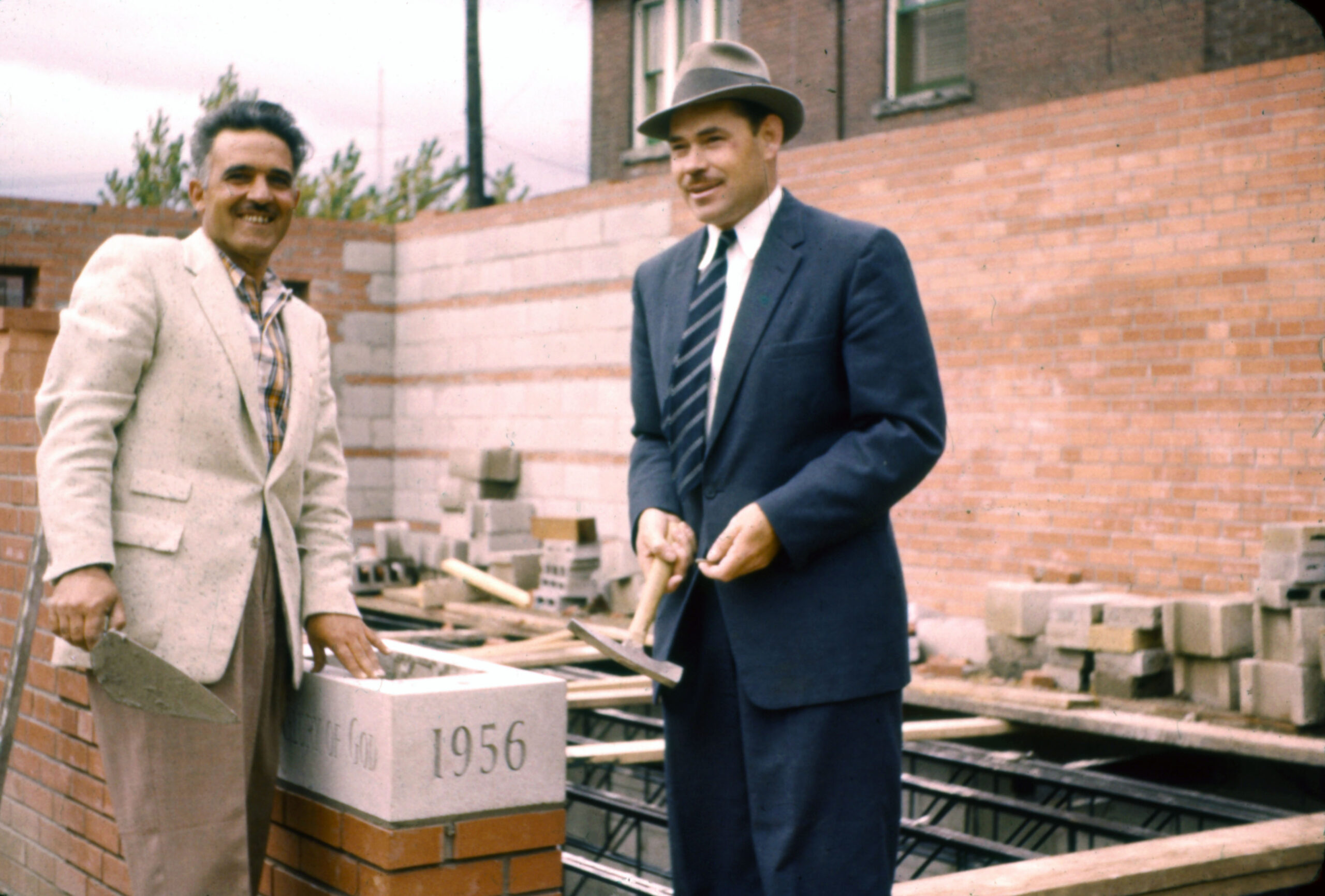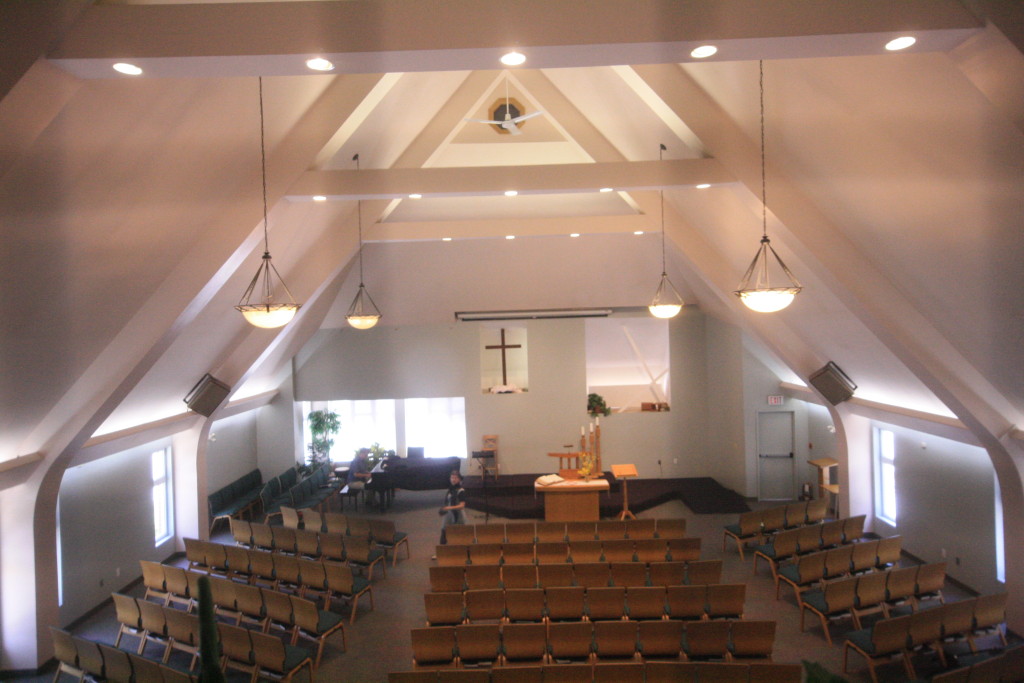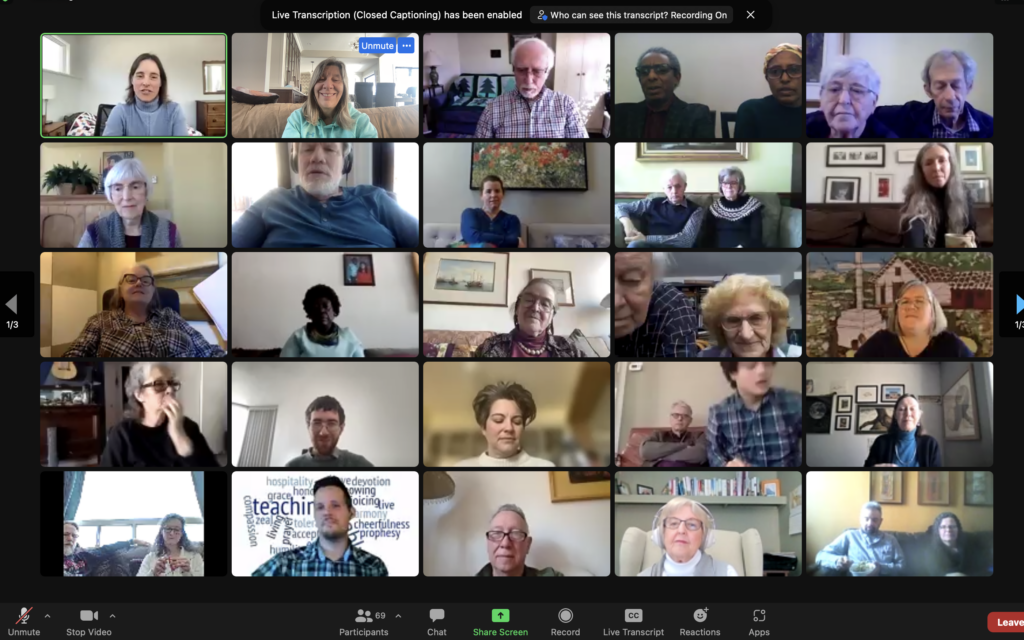Toronto United Mennonite Church was incorporated 75 years ago, after years of presence as a home-based congregation and then denominationally-funded mission church that met for some time at First Lutheran Church, on Bond St.
Mennonites who’d come to study or work in the big city longed to experience the shared faith and caring community they’d left behind in the smaller places in which they were raised. They willingly commuted from all over Toronto to worship together.
In the beginning, most members traced their roots to Mennonites whose ancestors migrated from the Netherlands and Germany to southern Russia and Ukraine in search of freedom to practise their faith as they chose – and then to Canada in the wake of political and social upheaval. Over the years, our congregation has become multicultural and we hail from five continents and speak many mother tongues. Many of us are first-generation Mennonites.

See also: Our story in our ‘stuff’
Some significant milestones in TUMC’s story
1948 TUMC is incorporated in February, meeting in a house on Victor St. where the pastor’s family lives above the meeting space and shares its only bathroom with congregants on Sunday mornings. H.A. Claassen serves as minister, followed shortly by Frank P. Dyck.
1950 Bill Dick becomes pastor.
1950s-60s Church gets involved with Menno House, a residence for university students.
1956 The growing congregation constructs a building on Queen St. E. First service is held in an incomplete and still-windowless facility in December, with the congregation wearing full winter clothing.
1960s Congregation members help create Silver Lake Mennonite Camp (near Sauble Beach).
The church offers children’s clubs and grapples with how to serve what was then a low-income neighbourhood while experiencing a decline in members.
1961 Nicholas Dick becomes pastor. Building is finally fully finished and dedicated in June.
1968 Helmuth Harder becomes pastor.
1970 Darrell Fast becomes pastor.
1970s TUMC plays a significant role in M2/W2, a prison visitation ministry. The church also presents a creative Peace Booth at the Canadian National Exhibition and joins other area churches to sponsor an annual festival in support of Mennonite Central Committee at Black Creek Pioneer Village.
1973 TUMC partners with Danforth Mennonite Church to envision St. Clair O’Connor Mennonite Community, an innovative residential complex that combines townhouses for young families with seniors’ apartments and nursing home care. (Construction was completed in 1983.)
1979 TUMC takes a leading role in sponsoring Vietnamese “boat people,” beginning a decades-long involvement in refugee sponsorship.
1980s The church develops a caring and preaching team.
Mississauga Mennonite Fellowship is founded as a spin-off from TUMC.
1986-7 Osiah Horst serves as interim pastor.
1987 Gary Harder becomes pastor. He begins a long-term practice of mentoring theological students with summer internships.
1990s A “baby boom” is accompanied by growth in adult membership and an increasing multicultural flavour. A mission and service committee is formed, as well as a club for junior-high youth. An associate pastor, Shannon Neufeldt, is hired to work with youth. TUMC takes a leading role in sponsoring and running the Mennonite Christmas Festival Sale, a weekend sale of fairly-traded crafts to benefit impoverished families around the world. Members join with people from other Mennonite congregations and MCC Ontario to establish Lazarus Rising, a homeless ministry. TUMC sponsors a large group of refugees from Kosovo.
1997 After years of pondering space issues and seeking a potential move, TUMC joins in a full building partnership with the Toronto Mennonite New Life Centre and Mennonite New Life Church of Toronto, with each holding a proportional stake in the property. The old building is torn down and a new multi-purpose facility erected on a slightly larger footprint.

2000s Under the leadership of Bock Ki Kim, TUMC begins a Korean-language fellowship that meets during Sunday school hour while participating in TUMC worship services.
The church engages in a difficult process of working through human sexuality issues.
Involvement in Lazarus Rising grows with member Doug Johnson Hatlem becoming a street pastor in collaboration with the downtown ministry of Sanctuary.
Church continues work with refugees from Colombia, Uganda, Zimbabwe and Iraq.
2005 Jonathan Slater and Maureen Louth become pastors of youth ministry.
2007 On Gary Harder’s retirement, the congregation begins a process of visioning its future, with David Brubacher serving as interim pastor. (Four initiatives emerge from this process in 2008: becoming a more welcoming congregation, revitalizing our spiritual formation, defining our local ministry/mission, and a fresh vision for using the church’s properties on Queen and Lark.)
2009 Marilyn Zehr becomes lead pastor.
2012 Jonathan Slater and Maureen Louth complete their terms.
2013 Michele Rizoli becomes Associate Pastor, with special responsibilities for youth ministry. The congregation sponsors two Eritrean refugees and begins work on a vision, plan and fundraising for an addition to the church building.
2014 With a congregational decision and substantial pledges of monetary and volunteer support, work begins on a building space renewal and mission development program that includes an expanded lobby area, new offices and basement space, as well as a complete renovation of a church-owned house to become Aurora House, Toronto’s first long-term shelter for victims of human trafficking. A new board is formed to direct creation of Aurora House, with programming assistance from our building partners, the Toronto Mennonite New Life Centre.
2015 As work is completed on the renovation of the future Aurora House and construction begins on the church renovation.
TUMC continues its refugee sponsorship tradition by preparing the way for a family awaiting sponsorship in Turkey.
2016 We welcome a refugee family of three from Iran in March.
Aurora House is dedicated in May and receives its first resident in June. TUMC celebrates the renovation of its own space in November. Here’s a video.
2017 Marilyn Zehr departs and Michele Rizoli becomes pastor, working with an interim three-person Ministry Team for Youth and Children (Audrey Wichert, Trent Voth and Cedric Martin). TUMC gives full blessing to same sex marriages and joins the Brethren Mennonite Council (for LGBT interests).
2018 Continuing its response to the work of the Truth & Reconciliation Commission, TUMC begins working more intentionally at reconciliation with our Indigenous brothers and sisters, beginning with territorial acknowledgments in worship services, book study and other awareness raising activities.
2019 Peter Haresnape, a longtime member and former Christian Peacemaker Teams worker with Indigenous issues, is discerned as our second pastor, serving half-time, and joining Michele Rizoli, along with Audrey Wichert and Cedric Martin (Ministry Team for Youth and Children) on the church ministry team.
Four young women and two children from Eritrea are welcomed as sponsored refugees.

2020 The Covid-19 pandemic calls us to new ways of ministering to one another and our community. Our last in-person service (March 15) is livestreamed to about half of our community. Services then move to the Zoom platform, along with Sunday school classes, youth gatherings and committee meetings. We are saddened to experience the death of former pastor Nicholas Dick as the disease sweeps through the St. Clair O’Connor long-term care section. Creativity and new skills are fostered as we learn to create meaningful gatherings on Zoom and to adapt “Guess Who’s Coming for Dinner (Drinks,)” the annual youth talent show, a Grade 12 graduation celebration, a kids’ scavenger hunt, the annual Advent Carol Sing, the Christmas Eve service, and many other customary activities to a virtual format. Members are connected with others to encourage regular “check-ins.” Some of our quilters get busy sewing masks and blankets for homeless people forced out of shelters by the pandemic. Families collect beans or buttons in a jar to stand in for the loose change offering, but members give generously by digital means and keep our budget on track. During the summer, we celebrate the 100th anniversary of Mennonite Central Committee with a worship series on the theme of service. The Zoom format allows us to enjoy listening to a variety of guest speakers from a distance, and to reconnect with former members who have moved away. We treasure small-group breakouts and virtual “lobby time” to keep in touch and discuss important topics. Our pastors develop TUMC On Air, an occasional podcast with the theme of “Be At Rest.” Members “TAG” (targeted acts of generosity) each other with thoughtful surprises as an antidote to isolation. A creative Under One Roof joint campaign with the New Life Church helps raise money for roof repairs, culminating in a fun way with an online silent auction of goods and services. As vaccinations rise and restrictions ease, youth and children’s activities, including summer day/overnight camp, return in outdoor settings, and we hold outdoor churchwide gatherings, including an evening Taize service in July and a Sunday morning service in August. A reopening committee works diligently to prepare a safety plan and technical capability to begin hybrid services (Zoom+limited gathering in our building) in September.
2021 TUMC has to go fully online again as Covid forces another lockdown. Members continue to find new and creative ways to spend time with each other and with God.
2022 Things begin to slowly open up and members are able to worship at 1774 Queen by late winter albeit with safety restrictions in place. The Covid rules are relaxed by the fall. Pastor Michele went on sabbatical starting in September until January 2023.
We welcome a family of six from Eritrea.
2023 TUMC embraces and continues with a fully hybrid service. Most committee meetings are online with people appreciating the flexibility of choosing in person or online. TUMC celebrates our 75th Anniversary.
